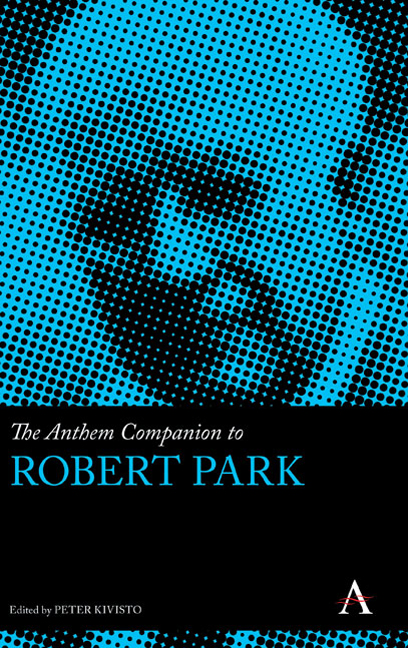Book contents
- Frontmatter
- Contents
- Introduction: The Legacy of Robert Ezra Park
- Chapter 1 A Twisted Path: Park, Gender and Praxis
- Chapter 2 Robert Park's Journey into Sociology
- Chapter 3 Beyond “Get the Seat of Your Pants Dirty in Real Research”: Park on Methods
- Chapter 4 The Basic Components of Social Action: Mead versus Park
- Chapter 5 Robert E. Park: Neglected Social Psychologist
- Chapter 6 Robert E. Park's Theory of Assimilation and Beyond
- Chapter 7 Robert Park's Marginal Man: The Career of a Concept in American Sociology
- Chapter 8 Marginality, Racial Politics and the Sociology of Knowledge: Robert Park and Critical Race Theory
- Chapter 9 The Cities of Robert Ezra Park: Toward a Periodization of His Conception of the Metropolis (1915–39)
- Chapter 10 The Impact of Robert E. Park on American Sociology of Religion
- Chronology
- Contributors
- Index
Chapter 5 - Robert E. Park: Neglected Social Psychologist
Published online by Cambridge University Press: 10 January 2018
- Frontmatter
- Contents
- Introduction: The Legacy of Robert Ezra Park
- Chapter 1 A Twisted Path: Park, Gender and Praxis
- Chapter 2 Robert Park's Journey into Sociology
- Chapter 3 Beyond “Get the Seat of Your Pants Dirty in Real Research”: Park on Methods
- Chapter 4 The Basic Components of Social Action: Mead versus Park
- Chapter 5 Robert E. Park: Neglected Social Psychologist
- Chapter 6 Robert E. Park's Theory of Assimilation and Beyond
- Chapter 7 Robert Park's Marginal Man: The Career of a Concept in American Sociology
- Chapter 8 Marginality, Racial Politics and the Sociology of Knowledge: Robert Park and Critical Race Theory
- Chapter 9 The Cities of Robert Ezra Park: Toward a Periodization of His Conception of the Metropolis (1915–39)
- Chapter 10 The Impact of Robert E. Park on American Sociology of Religion
- Chronology
- Contributors
- Index
Summary
Robert E. Park is widely recognized today for his contribution to urban sociology, race relations and collective behavior, but his social psychology has been largely neglected. Park's inclusive and loose framework covered his interest in: (1) human nature and the bio- physiological instincts, which he believed were the raw materials of personality; (2) the formulation of self- concept as an organization of roles; and (3) the micro- macro linkages between individual and social structure. Each one of Park's three themes is still important for symbolic interaction theory and offers insights into contemporary investigations of emotions, role acquisitions, and identity.
Robert E. Park (1864– 1944) represents a larger- than- life, romantic figure who personified the excitement of the research act and the rich intellectual potential of American sociology. He grew up on the prairie in Red Wing, Minnesota, studied with John Dewey, William James, Georg Simmel and Wilhelm Windelband; travelled widely in the United States, Europe, South America, South Africa and Asia; collaborated with figures as diverse as Booker T. Washington, W. I. Thomas, Emory Bogardus and Ernest W. Burgess; and mentored students such as Nels Anderson, Herbert Blumer, E. Franklin Frazier, Helen and Everett Hughes, Charles S. Johnson, Robert Redfield and Louis Wirth (Baker 1973; Matthews 1977; Raushenbush 1979). Today, he is widely recognized for his contributions to urban sociology, race relations and collective behavior, as well as for his role in defining the discipline through his influential textbook (Reynolds and Herman- Kinney 2003).
Yet, Park's contribution to social psychology, in general, and symbolic interaction theory, in particular, has not been widely recognized. On one hand, Blumer (1962, 1969) identified Park as one of the founders of symbolic interaction theory, and Turner (1967, 1968, 1976, 1990) regularly has acknowledged Park's contribution to a social psychological understanding of self and role. Fisher and Strauss (1978) made a strong case for the position that while early symbolic interactionists at the University of Chicago may have borrowed or applied Mead's ideas, they learned their sociology from Robert E. Park.
- Type
- Chapter
- Information
- The Anthem Companion to Robert Park , pp. 107 - 130Publisher: Anthem PressPrint publication year: 2017



